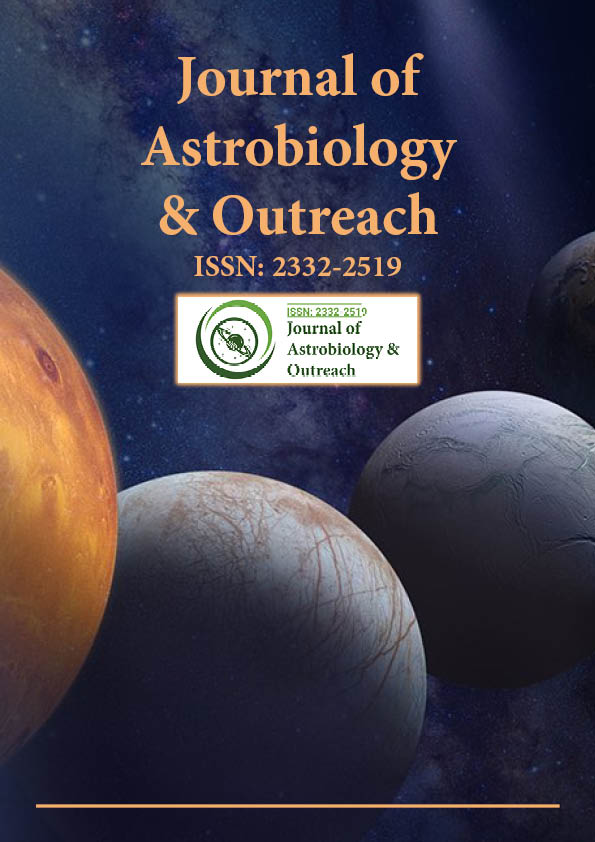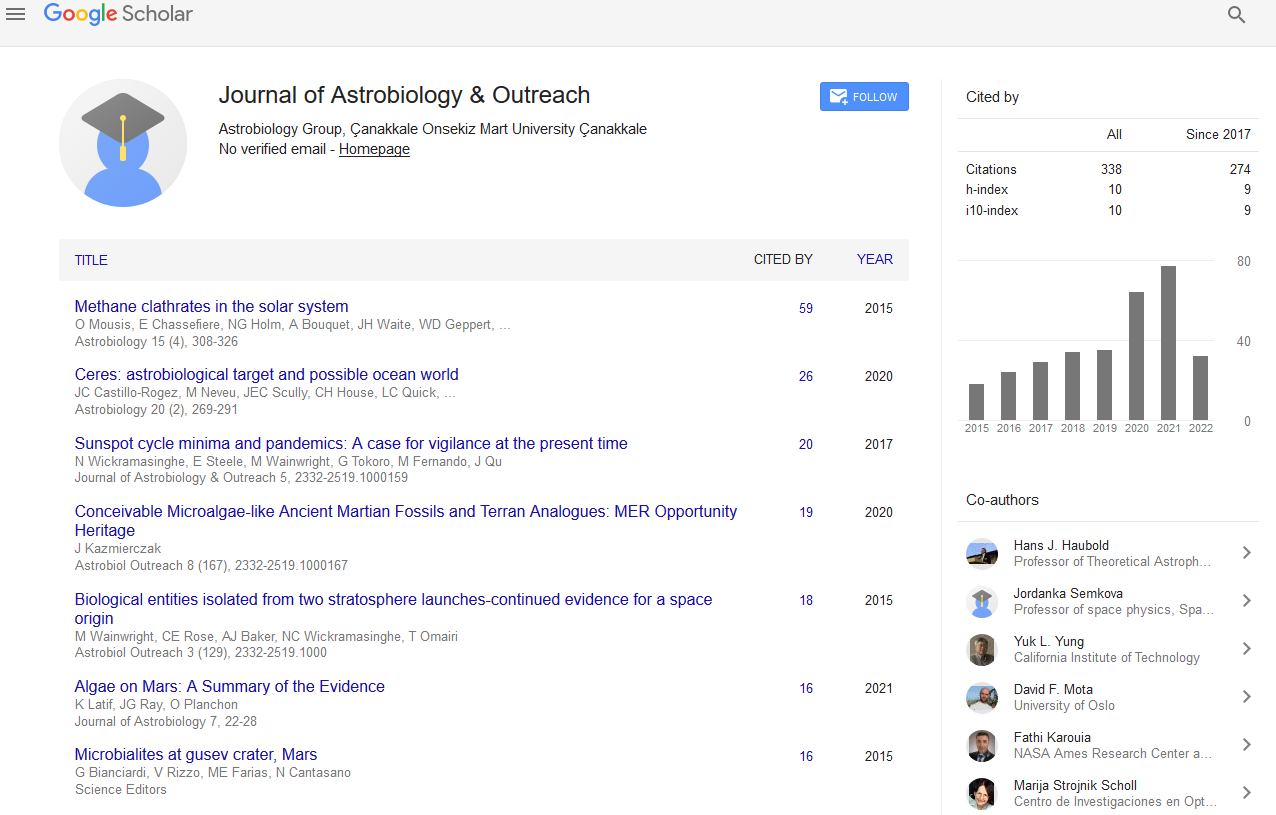Indexed In
- Open J Gate
- Academic Keys
- JournalTOCs
- RefSeek
- Hamdard University
- EBSCO A-Z
- OCLC- WorldCat
- Google Scholar
Useful Links
Share This Page
Journal Flyer

Open Access Journals
- Agri and Aquaculture
- Biochemistry
- Bioinformatics & Systems Biology
- Business & Management
- Chemistry
- Clinical Sciences
- Engineering
- Food & Nutrition
- General Science
- Genetics & Molecular Biology
- Immunology & Microbiology
- Medical Sciences
- Neuroscience & Psychology
- Nursing & Health Care
- Pharmaceutical Sciences
Perspective - (2023) Volume 11, Issue 6
Exploring Origins and Habitability of Earth: A Comprehensive View of Astrobiology
Antony Biasain*Received: 14-Nov-2023, Manuscript No. JAO-23-24753; Editor assigned: 17-Nov-2023, Pre QC No. JAO-23-24753 (PQ); Reviewed: 01-Dec-2023, QC No. JAO-23-24753; Revised: 08-Dec-2023, Manuscript No. JAO-23-24753 (R); Published: 15-Dec-2023, DOI: 10.35248/2332-2519.23.11.323
Description
Astronomy as a universal study, which helps to know the genesis, evolution, and distribution of life in the cosmos, has become a well-recognized and interesting branch of science. Now, top scientists may talk about their work, exchange ideas, and get inspired to discover the significant issues raised by the possibility of extraterrestrial life. The study of astrobiology includes a wide range of academic disciplines, including planetary science, biology, chemistry, geology, and astronomy. Experts from multiple fields have participated in this study, which contains a broad range of topics that collectively expand upon our knowledge of astrobiology.
Discovery habitable environments, both inside and beyond of the solar system, is a primary area of interest for astrobiology research. These examine the most recent methods and tools used to find possibly habitable worlds. To explore exoplanet surface characteristics, possible liquid water, and atmospheric components, scientists use spectroscopy, modeling, and remote sensing. Additionally, they study the habitability of solar system planets like Mars, Europa, and Enceladus, estimating the possibility of microbial life in their subterranean oceans or beneath their frozen surfaces. Another essential component of astrobiology knows the early stages of life. Researchers look at the functions of prebiotic chemistry, the accessibility of essential building components, and the environmental situations required for the emergence of life. Additionally, they look into the possibility that life started elsewhere in the cosmos. This is known as panspermia, and it describes the scenario in which life was carried through space and planted on other planets or moons. Another fascinating area of astrobiology is the study of extremophiles, or species that live in tough conditions. Researchers look at how extremophiles have adapted to harsh circumstances such as high pressure, acidic or alkaline conditions, and extremely high temperatures. Scientists are able to learn more about the limitations of life on Earth and the viability of simple conditions on other planets and moons by examining these hardy organisms.
Finding biosignatures, or proof of life or its history, is an essential part of astrobiology study. Researchers look into possible biomarkers and signs of life by using analytical instruments such as mass spectrometry and spectroscopy. They also discuss the difficulties in identifying biological signals apart from abiotic processes like photochemistry and mineralogy. To detect traces of life beyond Earth, this study guides the development of instruments and techniques that will serve as a basis for future missions to search for biosignatures on other planetary systems. As astrobiology advances and the search for extraterrestrial life accelerates, it is important to take into account the ethical implications and societal impacts of any potential discoveries. The present work explores the philosophical, theological, and cultural aspects of astrobiology as well as its wider implications for the perspective of humanity. By doing this, scientists want to advance scientific research practices and ensure that the social implications of astrobiology are appropriately considered beside scientific advancements.
Conclusion
The planetary and space science course on astrobiology contains a detailed account of the current status of astrobiology research. By presenting advancements in a variety of sub-disciplines, such as the research of extremophiles and the search for habitable conditions, as well as the analysis of biosignatures and the investigation of the origins of life, this highlights the interdisciplinary character of the subject. The analysis supports participation and more research, which will help scientists, students, and amateurs interested in the interesting field of astrobiology discover the complexities surrounding the possibility of life beyond the planet.
Citation: Biasain A (2023) Exploring Origins and Habitability of Earth: A Comprehensive View of Astrobiology. J Astrobiol Outreach. 11:323.
Copyright: © 2023 Biasain A. This is an open-access article distributed under the terms of the Creative Commons Attribution License, which permits unrestricted use, distribution, and reproduction in any medium, provided the original author and source are credited.

